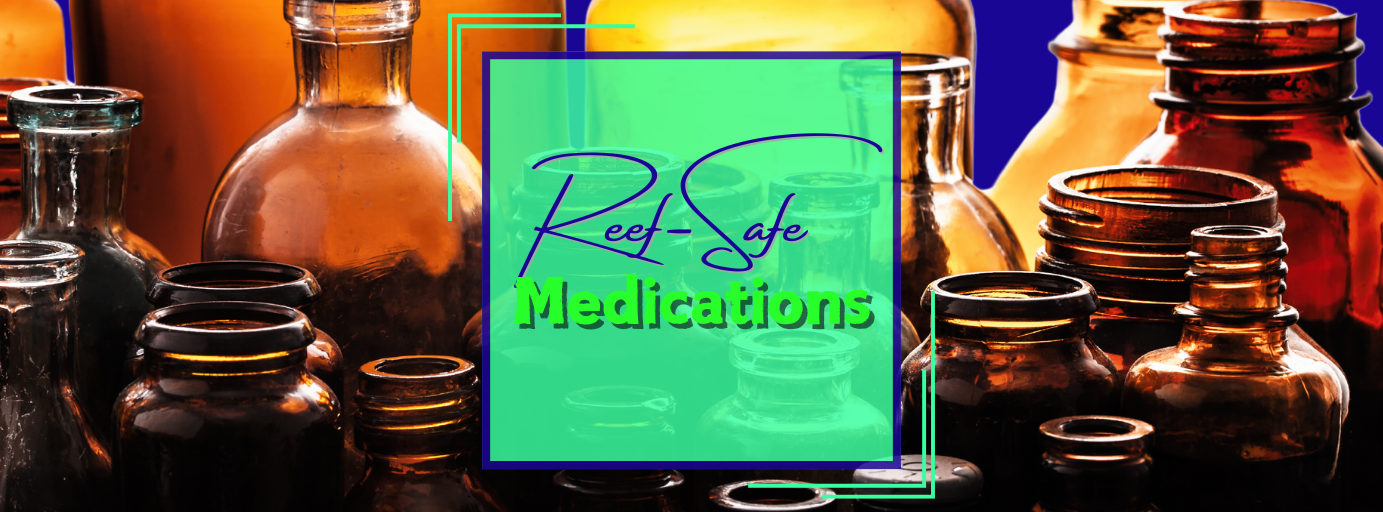𝐑𝐞𝐞𝐟-𝐒𝐚𝐟𝐞 𝐌𝐞𝐝𝐢𝐜𝐚𝐭𝐢𝐨𝐧𝐬:
𝐀 𝐂𝐨𝐦𝐩𝐥𝐞𝐭𝐞 𝐆𝐮𝐢𝐝𝐞
Updated: 5/6/25
Introduction
We have all been there. You add a fish without quarantining for various reasons, and then a disease pops up. What do you do? Maintaining a reef tank comes with its unique challenges, particularly when fish diseases arise that require treatment without causing harm to sensitive corals, invertebrates, and beneficial bacteria. Using medications in a reef tank is delicate work since many standard treatments can be harmful to the ecosystem. This comprehensive guide explores reef-safe medications, how to apply them safely, and best practices to ensure the health of your reef inhabitants while addressing fish diseases.
While there are several medications or herbal treatments available, not all of them provide a complete treatment. Some of the recommendations are to help the fish with the immediate symptoms and allow their immune system to try and fight it off on its own. This approach might or might not work. This article has been created to help your fish as much as possible when getting them out of the display tank, and having a proper quarantine isn't an option.
Looking to dive deeper into fish health and treatment options? Our book, “Marine Disease Diagnostics: A Practical Guide For Home Hobbyists,” offers detailed guidance for hobbyists at every level.
What Makes a Medication Reef-Safe?
Reef-safe medications are treatments formulated to minimize harm to corals, invertebrates, and the beneficial microorganisms that maintain the tank's biological balance. Unlike medications used in fish-only systems, these treatments do not typically contain chemicals like copper, which can be highly toxic to corals and many invertebrates. Instead, they focus on targeting the diseases affecting fish while leaving the sensitive reef environment relatively undisturbed. Make sure that you check labels and what warnings are labeled on the medications.
Using reef-safe medications reduces the need to move fish to a quarantine tank, allowing treatment in the main display tank without disrupting the entire system.
While I have tried to be comprehensive in this article, this certainly isn't an exhaustive list of options.
Remember that ALL medications, treatments, and and herbal remedies should be used cautiously and monitored.
Top 12 Saltwater Fish Diseases and Their Reef-Safe Treatments
I wanted to make a list of the top 12 saltwater diseases (not all have reef-safe treatments), the medications and herbal remedies that can be used in the display tank, and whether these are safe for corals, anemones, and invertebrates.
1. Marine Ich (Cryptocaryon irritans)
Read More About Marine Ich Here
2. Marine Velvet (Amyloodinium ocellatum)
-
Reef-Safe Medications:
- Polyplab Medic: Useful for early Velvet infections.
- Dosage: 1 scoop per 10 gallons daily.
- Duration: Continue for 10-14 days.
- Ruby Reef Rally Pro: Short-term use for Velvet and bacterial infections.
- Dosage: 1 oz per 10 gallons every 24 hours.
- Duration: 3 consecutive days.
-
Herbal Remedies:
-
Supportive Care:
- UV Sterilizer: Controls free-swimming parasites.
- Increased Oxygenation: Velvet reduces respiratory efficiency.
- Dim Lighting: Slows parasite activity and reduces stress.
3. Brooklynella (Brooklynella hostilis)
Read More about Brooklynella Here
4. Uronema
-
Reef-Safe Medications:
None. Uronema requires aggressive treatments that are not safe for reef tanks.
-
Herbal Remedies:
- Garlic Guard (Seachem): Provides immune support, though not a cure for Uronema.
-
Alternative Treatment:
-
Supportive Care:
- UV Sterilizer: Can help reduce parasite load.
- Maintain Pristine Water Quality: Reduces stress, helping fish manage the infection.
-
Are these complete treatments?
No. Uronema cannot be fully treated in a reef tank; fish must be moved to a quarantine tank.
5. Flukes (Monogenean Parasites)
6. Fin Rot (Bacterial Infection)
7. Popeye (Exophthalmia)
8. Head and Lateral Line Erosion (HLLE)
-
Reef-Safe Medications:
None, as HLLE is usually caused by poor diet, stress, or environmental factors.
-
Herbal Remedies:
- Garlic Guard (Seachem): Supports the immune system.
- Vitamin Supplements: Selcon and similar products boost fish immunity and overall health.
-
Supportive Care:
- Nutritional Improvements: Provide vitamin-rich foods, especially Vitamin C, and other essential nutrients.
- Check for Stray Voltage: Electrical issues can contribute to HLLE, so ensure that there are no stray currents in the tank.
- Pristine Water Quality: Clean water conditions promote recovery and prevent further damage.
-
Are these complete treatments?
No. Treatment focuses on improving environmental conditions and nutrition.
9. Internal Parasites (Nematodes, Worms)
10. Bacterial Infections
11. Lymphocystis (Viral Disease)
12. Fungal Infections (Saprolegnia)
-
Reef-Safe Medications:
-
Herbal Remedies:
-
Supportive Care:
- Pristine Water Quality: Prevents further fungal growth and promotes recovery.
- Increased Aeration: Ensures good oxygenation, which helps fish fight off infections.
Medications/Herbal Remedies
-
Brightwell Aquatics Garlic Power
-
GarlicGuard
- Company: Seachem (GarlicGuard)
- Target: Immune system support, parasite resistance
- Website: Seachem GarlicGuard
- Herbtana Microlift
-
- Company: MicroLift
- Target: Marine Ich, Marine Velvet, parasites, flukes
- Website: Herbtana
-
Kordon Herbal Ich Attack
-
Melafix
- Company: API
- Target: Mild bacterial infections, fin rot
- Website: API Melafix
-
Metroplex
- Company: Seachem
- Target: Internal parasites, protozoa (Hexamita), anaerobic bacteria
- Website: Seachem Metroplex
-
PraziPro
- Company: Hikari
- Target: Flukes, flatworms, external parasites
- Website: Hikari PraziPro
-
Polyplab Medic
- Company: Polyplab
- Target: Marine Ich and other parasites
- Website: Polyplab Medic
-
Ruby Reef Kick-Ich
-
Ruby Reef Rally Pro
- Company: Ruby Reef
- Target: Marine Velvet, Brooklynella, Uronema, bacterial infections
- Website: Ruby Reef Rally Pro
- Selcon
- Company: American Marine
- Target: Concentrate contains Omega-3 HUFA, Vitamin B12 and pure stabilized Vitamin C
- Website: American Marine Selcon
Supportive Care in Reef Tanks
For many saltwater diseases, supportive care plays a crucial role in helping your fish recover, especially when reef-safe medications are limited. Here’s how to support your fish while protecting corals and invertebrates:
-
UV Sterilization: UV sterilizers help reduce free-swimming pathogens like parasites, viruses, and bacteria. This is especially useful in managing diseases like Marine Ich, Velvet, and Brooklynella.
-
Increased Aeration: Many diseases, particularly parasitic infections, affect the gills, leading to respiratory distress. Increasing aeration or oxygenation in the tank helps fish breathe more easily and recover more quickly.
-
Vitamin-Enhanced Foods: Using supplements like Selcon boosts the fish’s immune system, helping them resist infections and recover faster. Providing a high-quality, nutrient-rich diet is essential to aid recovery from any disease.
-
Water Quality Management: Maintaining stable water conditions with regular water changes, effective filtration, and protein skimming reduces stress and keeps the tank inhabitants healthy. Consistent testing of water parameters helps you spot and correct any imbalances that could exacerbate diseases.
Common Myths
-
Myth: "Reef-Safe" Means Completely Safe for All Invertebrates and Corals
- Reality: Not all medications labeled "reef-safe" are safe for every type of coral, invertebrate, or anemone. For example, PraziPro is generally safe, but it can harm feather dusters and some delicate invertebrates. Always check the specific compatibility with your tank inhabitants before using any medication, even if it’s labeled "reef-safe."
-
Myth: Herbal Remedies Are Always Safe for Reef Tanks
- Reality: Herbal remedies, like tea tree oil and garlic extract, can be milder alternatives to chemical medications, but they are not always 100% safe for sensitive reef systems. Overuse or incorrect dosing can stress corals and invertebrates. It's essential to monitor your tank closely when using any treatment.
-
Myth: You Can Use Any Type of Garlic for Fish Health
- Reality: Only use aquarium-specific garlic products designed for marine tanks. Adding raw garlic or garlic intended for human consumption can introduce contaminants and unwanted additives to your tank.
-
Myth: Hydrogen Peroxide Will Kill All Diseases and Parasites in the Display Tank
- Reality: While hydrogen peroxide can be effective against algae blooms and certain parasites it often has to be used at a level that is unsafe for invertebrates or corals. It is best used as a supplemental treatment or for specific issues, and overdosing can harm fish, invertebrates, and corals.
-
Myth: Frequent Use of Antibiotics in Reef Tanks Won't Harm Biological Filtration
- Reality: Prolonged or excessive use of antibiotics such as Kanaplex or Metronidazole can impact your tank's beneficial bacteria, which are critical for maintaining water quality. Always follow the proper dosage and duration guidelines and monitor water parameters closely.
FAQ's
-
Can I treat diseases in my display tank without harming my corals or invertebrates?
- Yes, several reef-safe medications are available, such as PraziPro (with caution around feather dusters), Herbal Ich Attack, and Melafix. Always check the specific product compatibility with your tank inhabitants before treatment.
-
Can I use tea tree oil directly in my tank to treat bacterial infections?
- It can be, but it is safer to use commercial preparations like Melafix, which contains tea tree oil. The recommended dosage is 5 mL per 10 gallons for 7 days. It’s effective for mild bacterial infections and generally safe for most reef systems when used correctly.
-
Is garlic extract effective against parasites in saltwater tanks?
- Garlic has always been controversial in the saltwater hobby. Garlic extract is often used to boost fish immune systems and can help fish resist parasitic infections, but it is not a stand-alone cure for diseases like Marine Ich or Velvet. It should be used alongside other treatments. There is no proof that adding garlic helps, but many hobbyists swear by it.
-
Is hydrogen peroxide safe for use in my display tank?
- Hydrogen peroxide can be used in low concentrations (1-2 mL of 3% hydrogen peroxide per 10 gallons) for algae control or specific infections. However, it can reduce oxygen levels temporarily, so ensure proper aeration and avoid overuse.
-
How can I treat Marine Velvet in a reef tank?
- Unfortunately, there are no fully reef-safe medications for Marine Velvet. The best course of action is to move the infected fish to a quarantine tank and treat with copper or chloroquine phosphate. In the display tank, supportive care measures like UV sterilization and increased oxygenation can help manage the outbreak.
-
Can I combine herbal remedies with chemical medications in the tank?
- It depends on the specific treatments. Garlic extract and Herbal Ich Attack are often used alongside other medications like Metroplex or PraziPro, but always ensure you are not overdosing or causing unnecessary stress to your fish or invertebrates.
-
What’s the best way to prevent disease outbreaks in my reef tank?
- The best prevention is a combination of quarantining new arrivals, maintaining pristine water quality, and providing a nutrient-rich diet. Using supplements like garlic extract or vitamin-enriched foods can also help boost fish immunity.
-
Can reef-safe medications affect my tank’s biological filtration?
- Yes, even some reef-safe medications, especially antibiotics like Metroplex or Kanaplex, can harm beneficial bacteria over time. Monitor your water parameters closely and be cautious of prolonged use.
-
Should I turn off my protein skimmer or UV sterilizer while treating with herbal remedies or medications?
- For products like Melafix, you should reduce or turn off the protein skimmer temporarily to prevent excessive foaming. Some medications may also require turning off UV sterilizers to avoid degrading the treatment’s active ingredients. Always check the product’s instructions for guidance.
Conclusion
Successfully treating diseases in a reef tank requires balancing effective disease management with the safety of your corals, invertebrates, and other sensitive organisms. By utilizing reef-safe medications, herbal remedies, and focusing on supportive care, you can help your fish recover from common saltwater diseases while keeping your reef inhabitants safe. Always remember to monitor your tank closely during treatment and follow dosage instructions carefully to avoid harming your delicate reef ecosystem.
Happy Reefing!








.png)